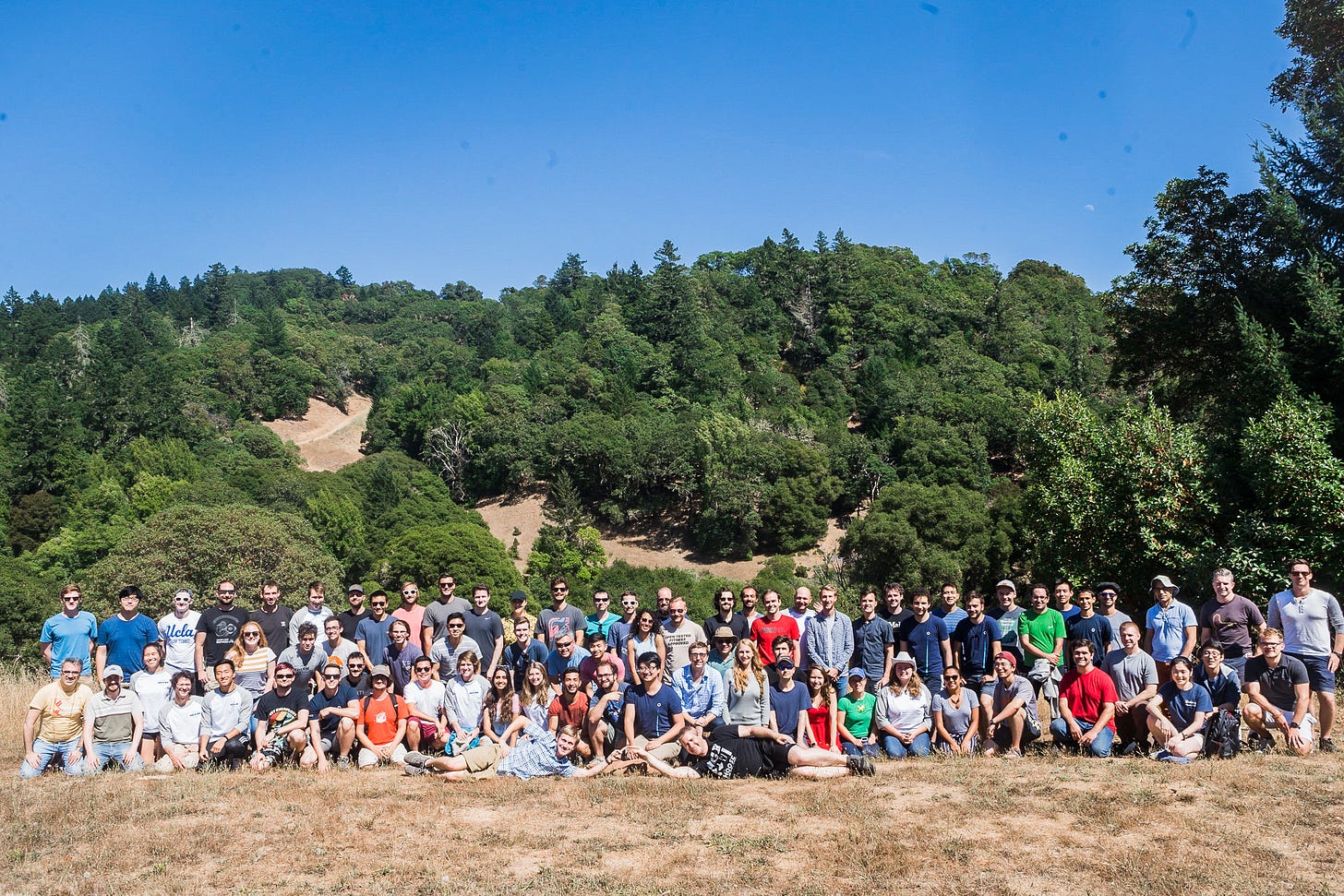Startup life seems scary from the outside. Every time I talk to students about what it’s like to work in Silicon Valley, I get at least one question with this sort of emotional tenor:
“Given that a light breeze might push you into financial ruin and career-ending failure, how do you sleep at night?”
My answer is always the same: I reject the premise. It’s really not that risky to join a startup as an employee.

If you join a startup’s founding team, you are taking a risk — your salary will start low, your job will be unstable, and your personal equity stake will almost certainly be worth $0 for the trouble.
But if you join a startup as Employee #100, your experience will be fundamentally different. Your base salary will be pretty close to normal (tech) market rates. Your company’s runway will be longer, and your paycheck will be more secure. The odds of making some $$ on your equity will be far higher. You’ll still get some of the same freedom and responsibility that you expect from startup life, but you won’t go broke if the company fails.
I expect that many Outsiders don’t even know that this is an option — but it absolutely is. In fact, most people working at startups today have made that choice! There’s nothing wrong with choosing a different spot on the risk/reward curve; you’re no less cool for wanting to be an employee of a startup rather than a founder.
Startup failure is such a pervasive fear, however, that it’s worth a point-by-point takedown. Here are the four biggest (perceived) risks of joining a startup — job stability, financial ruin, reputational damage, and wasting time — and why I think they’re mostly overblown.
😱 The Prime Fear: Job Stability
What happens if my startup fails and I lose my job? What if we “pivot”? What happens if there’s an economic downturn?
The implicit question behind all of the questions above is “Do I think this startup will be around for 10-20 more years?” And that’s just an implicit comparison to the mega-stable, life-long careers that folks had in the 1950s. Modern careers, however, don’t work that way — the average American changes their job every 4.1 years.
Given that startups usually raise money every 18-24 months, here’s a better question to ask about startup job stability:
Do I think this startup can raise another financing round?
If you do, there’s nothing to fear — you’ll have plenty of time to learn, to grow, and to build up your resume for whatever opportunity you pursue next. If don’t think they can raise again, don’t join.
Even in the case of impending startup failure, however, you still don’t have too much to worry about. First, you can just find another job before the company shuts down. It’s hard for founders to leave, but employees don’t have the same problem.
But second, and even more reassuringly, Silicon Valley startups often support their employees through failures. And this isn’t some “failure is okay!!” mumbo jumbo; I mean they give tactical help to help their employees find new jobs. I’ve had founders send me Google Sheets that list the employees of their failing startups, including their specialties, resumes, and contact information; I’ve seen a failing startup keep on their recruiting team until late in the shutdown process, tasking them with placing employees at new companies.
Small companies like startups care about each individual employee — which is something you can’t say about megacorporations. I’d much rather go through a startup shutdown than a corporate layoff; at least I’d get real support from the former.
💸 The Fear of Financial Ruin
Don’t startups pay you less in salary? Isn’t most startup equity worthless? What happens if I blow through my savings?
If you find a well-established startup — over 100 employees, Series C or later — you’re going to make a comfortable salary. Speaking from personal experience, this is particularly true today with SPAC money flooding into the system. (See here for a SPAC explainer, or see GIF below.)
It’s true that founding employees will often take a haircut on salary to earn a big chunk of equity; it’s also true that huge companies can afford to drown their employees in compensation to spruce up otherwise mediocre recruiting pitches. But it’s not true that you’ll be dipping into your savings as an average startup employee — that might be true for founders, but not for you.
Series A/B companies will usually pay you about 80% of the prevailing tech market rates, and tech talent is paid exceptionally well in Silicon Valley.
One blogger estimated that it takes a programmer who is “not particularly successful, but not particularly unsuccessful” at Google to take six years to earn over $1 million in total comp. That is, needless to say, well above the national average, and you’d be just fine making 80% of that number.
If you want something more concrete that that estimation, check out AngelList’s “Startup Salary & Equity” calculator. Hilariously, Silicon Valley wages are so high that they break their own formatting!
Another myth about startup comp is that the equity likely won’t be worth anything to you until the startup “exits” (sells to another company, or goes public). In truth, there’s a third option that many startups use to give their employees some liquidity (read: $$$$): the “secondary transaction.”
Secondaries are when investors buy shares from existing shareholders, like employees. This often happens at later-stage companies that aren’t yet public
(e.g., SpaceX, who had a $750 million secondary with their February 2021 fundraise). Employees often get access to secondaries after they’ve been at the company for a while, so it’s not a fast path to liquidity, but it’s much quicker than the aggregate stats about startup exits would lead you to believe.
🥴 The Fear of Tarnishing Your Reputation
If my startup fails, won’t I be ashamed and unhireable?
Short answer: no. Again, I’ll spare you the “failing is okay!!” pep talk, because the reality is more nuanced.
As a startup hiring manager, I don’t care what your company did, I care what you did.
I love finding employees with previous startup experience — even if those startups ultimately failed — because it’s easy to assess their personal contributions. The real reputational fear of working at a startup is that there’s nowhere to hide: you can’t shirk responsibility or rely on the work of others to make yourself look good. In fact, you’ll often have far less “air cover” at a startup — meaning, tangibly, there are fewer approvers above you to blame when things go wrong, so you bear more of that responsibility yourself.
For some folks, that might sound terrifying.
But if that sounds exciting — if you’re ready to put your skills to the test — startups can be a uniquely great place to work.
⏳ The Risk of Wasting Time
Won’t I have lost years of my career and life if my shares don’t end up making me a millionaire?
I find that many folks give too much consideration to the financial side of a job hunt, and therefore focus too little on the actual experience of working at the companies they’re considering.
It is true that most startups fail, and it is true that most startup equity ends up being worthless. But to reduce the decision about what makes a good use of your time to the binary question of “am I a millionaire or am I not” is silly. Given that the average tenure of a job is about four years, another frame might be better:
Startups are like schools that you get paid to attend.
Compared to the normal corporate world, startups move at warp speed. I interviewed at Astranis on a Wednesday, accepted their offer that Friday, started the next Monday — and sat on the other side of the interviewing table that very same day.
No mandatory waiting period stood between me and actually doing the work. That’s a recipe for incredibly fast learning, and that learning will pay dividends for the rest of my career. (I also find being thrown into the fire ridiculously fun, a benefit that also shouldn’t be ignored.)
So, no: you won’t have wasted your time by working at a failed startup. You also won’t have ruined yourself financially, tarnished your reputation, or signed up for an inherently unstable situation. Startups seem pretty scary from the outside, but they’re really not all that risky — your downside is capped, and your upside is uncapped.
That profile makes for a really great bet, and it’s why I’ve decided to spend my career in startups. Don’t let irrational fears prevent you from doing the same.
Thanks for reading Silicon Valley Outsider! I’m Christian, the Chief of Staff of Astranis, and I write this newsletter for folks who are interested in startups but live outside of the SF Bay Area.
If you want to join 500+ folks in getting an email from me each Monday, I’ll help you understand Silicon Valley using normal-human words.
Here are a few past editions that you might like if you enjoyed this one:








